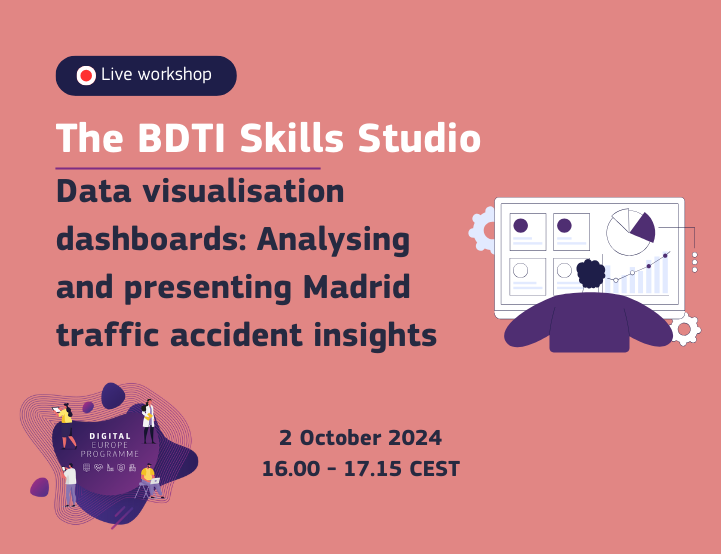Mastering data visualisation empowers you to transform complex data into clear, actionable insights, enhancing your ability to make informed decisions and communicate effectively. Dive into data visualisation essentials is this workshop.
- digital skills | machine learning | artificial intelligence | open data | public data | data science
- Wednesday 2 October 2024, 16:00 - 17:15 (CEST)
- Online only
Practical information
- When
- Wednesday 2 October 2024, 16:00 - 17:15 (CEST)
- Where
- Online only
- Languages
- English
- Part of
- Website
- Event slides and code
- Social media links
Description
In this workshop, we will explore the core principles of data visualisation, focusing on how to analyse and present static geospatial data effectively. Participants will learn how to manage and visualise datasets using Python, PostgreSQL, Metabase, and QGIS. The workshop will utilise a practical use case involving the visualisation of traffic accident data, leveraging the tools provided by the BDTI platform.
All the tools used during these workshops are available for free to EU public administrations through the BDTI platform. Learn how to apply for BDTI here.
The use case will involve analysing traffic accident data to identify high-risk areas, visualise traffic management measures like speed cameras and radars, and create informative dashboards. This hands-on session will provide valuable insights for public sector organisations seeking to enhance urban safety and implement data-driven traffic control strategies.
What you’ll get from this workshop:
- A thorough understanding of data visualisation techniques and their applications in urban safety analysis
- Hands-on experience in managing and visualising static datasets
- Skills in data preprocessing, storage, and integration using PostgreSQL
- Knowledge of creating interactive dashboards using Metabase
- Practical applications of QGIS for visualising geospatial data and identifying high-risk traffic zones
Who should join?
This workshop is ideal for professionals in urban planning, public administration, traffic management, and data analysis, as well as anyone interested in enhancing urban safety through data visualisation. It is designed for beginners and does not require prior experience in data analysis or visualisation. Participants looking to apply data insights to real-world challenges in traffic safety and urban management will find this course particularly valuable.

